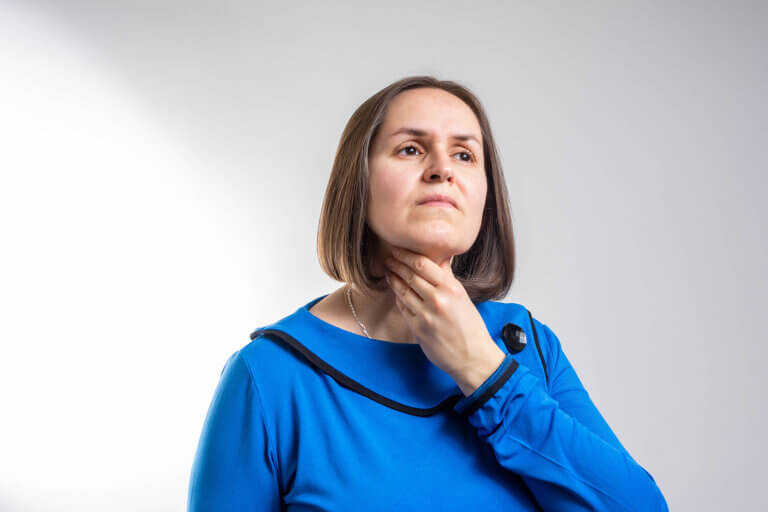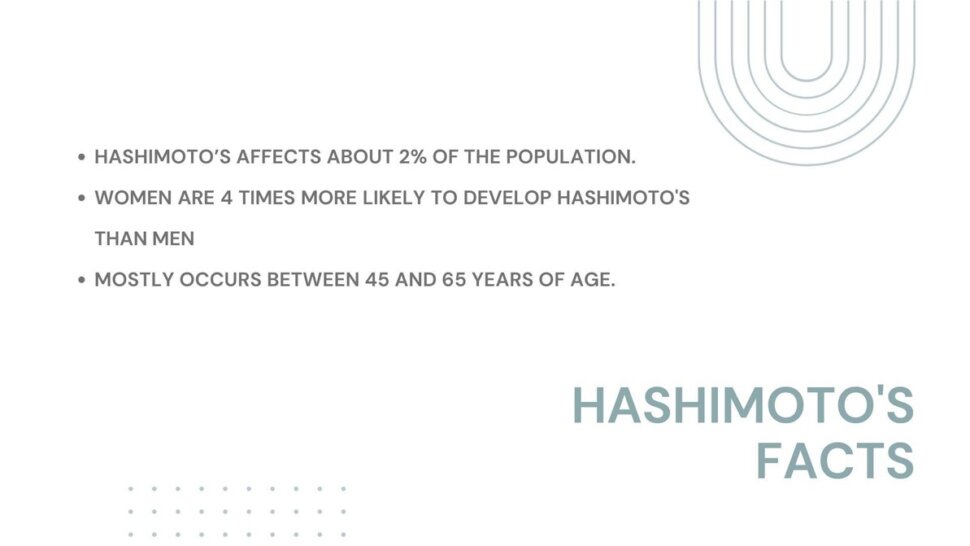Heal Your Hashimoto’s Disease
| | Reading Time: 6 minutes

Why standard thyroid testing doesn’t address one of the main causes of Hashimoto’s disease – estrogen dominance.
Hashimoto’s disease, also called chronic lymphocytic thyroiditis, is more common than previously thought. In the US, up to 5 percent have some Hashimoto’s symptoms. And it’s a global problem, mostly for women. A 2022 study found that women are four times more likely to develop Hashimoto’s thyroiditis than men. The authors describe it as a “hidden medical burden” that’s a growing problem worldwide. Despite the high incidence of Hashimoto’s, this debilitating condition remains poorly understood and often goes underdiagnosed or inadequately treated. In this article, we’ll look at one of the main causes of Hashimoto’s disease, estrogen dominance, and outline a path for healing your thyroid gland.

What is Hashimoto’s Disease?
Hashimoto’s disease, also called chronic thyroiditis, is an autoimmune condition where the immune system attacks and destroys thyroid cells resulting in reduced thyroid function. The exact cause remains unclear, but researchers are certain that too much iodine triggers Hashimoto’s. In contrast, the most common cause of hypothyroidism is not enough iodine.
The disease process of Hashimoto’s involves the immune system forming antithyroid antibodies that attack the thyroid gland’s tissue, causing progressive fibrosis. The most common antibodies in Hashimoto’s disease are anti-thyroid peroxidase (TPO Ab) and anti-thyroglobulin antibody (TG Ab). Both are commonly checked in screening laboratory tests for Hashimoto’s.
Lymphocyte infiltration and fibrosis as typical features of Hashimoto’s. Over time, chronic inflammation causes diffuse, symmetrical thyroid gland enlargement easily palpated by your doctor.
Hashimoto’s Symptoms
Early non-specific symptoms are similar to hypothyroidism and include easily feeling cold, dry skin, brittle nails, swelling around the eyes, and ankle and hand swelling. You may have brittle nails. Your heart rate may be slow. Both hypothyroidism and hyperthyroidism can increase blood pressure. You may have delayed tendon reflexes. Your speech may be slow, and you can have a delayed response when asked questions. Your tongue may become enlarged.
- Fatigue
- Muscle weakness
- Exercise intolerance
- Slower hair growth
- Dry, coarse, dull, and brittle hair
- Dry skin
- Slower speech, delayed response
- Ankle and hand swelling
- Slow heart rate
How is Hashimoto’s Disease Diagnosed?
Standard lab tests for Hashimoto’s include thyroid stimulating hormone (TSH), total and free thyroxine (T4 and T3), and TPO Ab. But because Hashimoto can also be related to other autoimmune diseases, such as pernicious anemia, adrenal insufficiency, and celiac disease, getting additional tests to rule these out is important. That’s why I test cortisol and screen for gluten sensitivity.
Gluten intolerance can trigger the immune system to attack the thyroid gland. And celiac disease (CD), a genetic autoimmune condition of gluten sensitivity, shares common characteristics with Hashimoto’s disease. But the gluten sensitivity and CD link are uncommon. Many studies support a connection but only in about 5 percent of adults with Hashimoto’s.
However, if you have Hashimoto’s, following a gluten-free diet for a few months is worth trying. Avoiding gluten-containing grains may be just the start you need in fixing your thyroid. If you’re more scientific-minded, you can explore the connection between your gut microbiome with a comprehensive stool test from Genova Diagnostics or the GI-MAP assay. And Labcorp or Quest Diagnostics provide tests for the genetic markers of Celiac. Be mindful that having CD and Hashimoto’s makes for a complicated condition called Autoimmune Polyglandular Syndrome (APS) that requires expert medical diagnosis and detailed treatment guidance.
However interesting the gut-thyroid connection is, I found that the link between estrogen and Hashimoto’s disease is often overlooked in women. And once diagnosed, you can manage it mostly on your own.
The Role of Estrogen Dominance
Because women are four to ten times more likely to develop Hashimoto’s than men, it makes sense to test estrogen. Women with estrogen dominance have an even greater risk. Estrogen dominance factors in polycystic ovarian syndrome (PCOS) and is linked to a three-fold increased risk for Hashimoto’s disease.
How to Heal Your Thyroiditis
Hashimoto’s thyroiditis is a complex, serious disease. Besides causing fatigue and brain fog, it contributes to infertility, causes weight gain and water retention, and sensitivity to cold. Gluten sensitivity is often involved but is not the root cause. Therefore, taking a holistic approach, including rebuilding the gut microbiome and following a thyroid-friendly diet, is an important first step.
Eat a plant-based, anti-inflammatory diet. Take nutrients to support thyroid health, including vitamin D, selenium, ferritin, vitamins B1 and B6, zinc, copper, and magnesium. Getting enough vitamin D is important because it modulates immune functions.
But to heal your thyroid, reset your hormones. First, assess your hormone levels to see if you have estrogen dominance. I start my Hashimoto’s patients with a blood test of their progesterone and estradiol levels from a national laboratory like Quest Diagnostics or Labcorp. But to get to the root of why you have Hashimoto’s disease, you need a detailed test of your progesterone and estradiol levels.
I was fortunate to have been taught the European tradition of hormone evaluation by Dr. Thierry Hertoghe of Brussels, Belgium. Dr. Herthoghe is the president of the International Hormone Society. He is a fourth-generation medical doctor whose great-grandfather, Eugene Hertoghe, discovered desiccated thyroid glandular to treat hypothyroidism and published his findings in 1899. Dr. Hertoghe’s book, Hormone Solution, is a classic in hormone replacement therapy.
Dr. Hertoghe, and many other functional medicine physicians, advise 24-hour urine testing when looking for deeper hormone insights. This involves staying home for one day while you collect all your urine for 24 hours. For this testing, I recommend Meridian Valley Lab. This is one of the few labs that measure 2-Methoxyestradiol, a natural metabolite of estradiol. Excess amounts of 2-Methoxyestradiol are linked to estrogen dominance, one of the main causes of autoimmune thyroid activity leading to the release of TPO.
Low progesterone is also associated with estrogen dominance. And when progesterone production declines during aging, the thyroid gland produces less T4. Applying progesterone cream is one of the first steps in treating estrogen dominance. But be careful when using progesterone. Too much is associated with a small but increased risk of thyroid cancer in women taking fertility drugs.
Hormone & Antibody Tests for Hashimoto’s:
– Progesterone
– Estradiol
– Follicle Stimulating Hormone (FSH)
– Testosterone
– 2-Methoxyestradiol
– Anti-thyroid peroxidase antibody (TPO Ab)
– Anti-thyroglobulin antibody (TG Ab)
Be sure to have a thyroid ultrasound, also called a sonogram. The ultrasound image tells the presence of diffuse enlargement of the thyroid gland. Elevated serum TPO Ab and TG Ab with a positive ultrasound image confirms the diagnosis of Hashimoto’s disease.
Healing Hashimoto’s Thyroiditis
Hashimoto’s can be safely treated and effectively managed but is difficult to cure. Healing your thyroid gland is complex and takes time. Start by avoiding gluten and improving your diet. Add supplements. Then start thyroid hormone replacement if indicated and under the supervision of a doctor knowledgeable in Hashimoto’s. Add progesterone to counterbalance estrogen replacement.
Working with a knowledgeable doctor for specific treatments to reprogram your immune system and heal your thyroid gland is invaluable.
Because Hashimoto’s is so common, you’ll find many helpful resources online. Of course, some are better than others. I recommend reading books on thyroid health by Isabella Wentz, PharmD.
FAQs
Where is the thyroid gland?
Is Hashimoto’s an autoimmune disease?
Can Hashimoto’s be cured?
How can I get comprehensive thyroid testing?
Where can I get bioidentical progesterone cream?
Your doctor can prescribe a personalized amount for you from a compounding pharmacy. You can buy low-dose natural progesterone online or order through my website from Fullscripts.
Bezwecken is my preferred brand. They were the first to provide researched-based natural progesterone direct to patients. It is available as a cream, in drops, or vaginal ovals.



References
Arduc A, Aycicek Dogan B, Bilmez S, Imga Nasiroglu N, Tuna MM, Isik S, Berker D, Guler S. High prevalence of Hashimoto’s thyroiditis in patients with polycystic ovary syndrome: does the imbalance between estradiol and progesterone play a role? Endocr Res. 2015;40(4):204-10.
Hu X, Chen Y, Shen Y, Tian R, Sheng Y, Que H. Global prevalence and epidemiological trends of Hashimoto’s thyroiditis in adults: A systematic review and meta-analysis. Front Public Health. 2022 Oct 13;10:1020709.
Li, Y., Zhou, G., Ozaki, T. et al. Distinct histopathological features of Hashimoto’s thyroiditis with respect to IgG4-related disease. Mod Pathol 25, 1086–1097 (2012). https://doi.org/10.1038/modpathol.2012.68
Ruscio M, Guard G, Piedrahita G, D’Adamo CR. The Relationship between Gastrointestinal Health, Micronutrient Concentrations, and Autoimmunity: A Focus on the Thyroid. Nutrients. 2022; 14(17):3572. https://doi.org/10.3390/nu14173572
Wang SH, Myc A, Koenig RJ, Bretz JD, Arscott PL, Baker JR. 2-Methoxyestradiol, an endogenous estrogen metabolite, induces thyroid cell apoptosis. Mol Cell Endocrinol. 2000 Jul 25;165(1-2):163-72.
doi: 10.1016/s0303-7207(00)00249-5. PMID: 10940494.
Nodehi, M., Ajami, A., Izad, M., Asgarian Omran, H., Chahardoli, R., Amouzegar, A., Yekaninejad, S., Hemmatabadi, M., Azizi, F., Esfahanian, F., Mansouri, F., & Akbar, A. (2019). Effects of vitamin D supplements on frequency of CD4+ T-cell subsets in women with Hashimoto’s thyroiditis: A double-blind placebo-controlled study. European Journal of Clinical Nutrition, 73(9), 1236-1243.
http://doi: 10.3109/07435800.2015.1015730. Epub 2015 Mar 30.
doi: 10.3389/fpubh.2022.1020709. PMID: 36311599
https://doi.org/10.3390/nu14091727
Szczuko, M., Syrenicz, A., Szymkowiak, K., Przybylska, A., Szczuko, U., Pobłocki, J., & Kulpa, D. (2022). Doubtful Justification of the Gluten-Free Diet in the Course of Hashimoto’s Disease. Nutrients, 14(9).
doi:10.1016/s0303-7207(00)00249-5.


